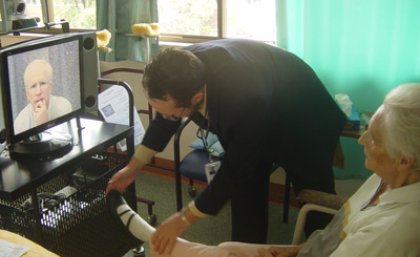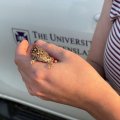
The University of Queensland is one of nine recipients to share a $20 million Federal Government fund for trialling innovative health care delivery over the national broadband network (NBN).
The grant will enable UQ’s Telerehabilitation Research Unit (TRU), Centre for Online Health (COH) and Centre for Research in Geriatric Medicine (CRGM) to deliver high-speed telehealth to older people living in Queensland.
Chief Investigator and Telerehabilitation Research Unit Co-Director Professor Deborah Theodoros will lead the UQ team of researchers that will deliver the ConTAC (Comprehensive Telehealth Assisted Care) program to 650 older people.
“The aim is to provide more efficient and effective care, reduce travel time and improve clinical outcomes using telehealth,” Professor Theodoros said.
The program is funded by a $2.75 million Department of Health and Ageing NBN Enabled Telehealth Pilots Program grant.
Facilitated by UniQuest, UQ’s commercialisation company, the program will deliver telehealth services to Queenslanders in residential aged care facilities and those in need of palliative care in their homes.
Professor Theodoros said telehealth services would be greatly improved by the high-speed, reliable broadband provided by the NBN.
“Access to health services will be more accessible throughout Queensland, particularly for older people living in rural or remote areas,” she said.
“Telehealth reduces the need for health-related transport, which in turn reduces costs and stress.
“UQ’s TRU, COH and CRGM are collaborating on this project to provide the best possible outcome for older people living in Queensland,” she said.
COH and CRGM Director Professor Len Gray said the three UQ centres were in an ideal position to provide telehealth-assisted care to Queenslanders.
“The COH and CRGM are leaders in providing geriatric telemedicine services, and the NBN Enabled Telehealth Pilots Program grant will help improve quality of care to many of those in need of better care,” Prof Gray said.
UniQuest acting CEO Dr Dean Moss said the program would focus on patients who needed high-cost aged care and palliative services.
“Receiving support of this level highlights the Federal Government’s confidence in UQ’s capacity to translate research expertise into products and services that directly benefit Australians,” Dr Moss said.
Media: Deb Theodoros (d.theodoros@uq.edu.au) or Jo Grey, Communications and Media, University of Queensland’s Centre for Online Health (07 3346 4754 or j.grey2@uq.edu.au).
About UQ’s Telerehabilitation Research Unit
The Telerehabilitation Research Unit consists of a multi-disciplinary group of researchers within the School of Health and Rehabilitation Sciences who are involved in the development of online applications for the delivery of allied health services to persons with physical, communication, and hearing disabilities. The research group consists of individuals from the disciplines of speech pathology, physiotherapy, occupational therapy and audiology. The overall objective of the Telerehabilitation Research Unit is to develop, validate and implement telerehabilitation applications to improve access to allied health services for persons with communication disorders, physical disability and/or hearing impairments both within the home, and in rural and remote environments.
www.uq.edu.au/telerehabilitation
About UQ’s Centre for Online Health
The Centre for Online Health (COH) is a part of the School of Medicine within the Faculty of Health Sciences at The University of Queensland. With over 12 years of experience, the COH is recognised internationally for its role in research, service delivery and education and training in the fields of telemedicine, telehealth and e-Healthcare. The COH's researchers, academic researchers, educators, technicians, engineers and coordinators ensure best practice in Australian telehealth. The centre's keys areas of activity include clinically focussed research; academic and vocational education and training; and the provision of clinical telemedicine services, including one of the world’s largest paediatric telemedicine services. www.uq.edu.au/coh/
About UQ’s Centre for Research in Geriatric Medicine
The Centre for Research in Geriatric Medicine is among the most successful geriatric medicine research organisations in Australia. It has a strong multi-disciplinary focus, with researchers of diverse background contributing to its work - medicine, nursing, allied health, psychology, biomedical engineering, health economics and software development. Established in 2002, it has developed a reputation for innovation in the application of novel systems of care, information technology and telemedicine to advance access to, and quality of, specialist aged care services. www.som.uq.edu.au/research/research-centres/centre-for-research-in-geriatric-medicine.aspx
Established by The University of Queensland in 1984, UniQuest is widely recognised as one of Australia’s largest and most successful university commercialisation groups, benchmarking in the top tier of technology transfer worldwide. From an intellectual property portfolio of 1500+ patents it has created over 70 companies, and since 2000 UniQuest and its start-ups have raised more than A$450 million to take university technologies to market. Annual sales of products using UQ technology and licensed by UniQuest are running at A$3 billion. UniQuest is also a leading Australasian provider of international development assistance recognised for excellence in technical leadership, management and research.
www.uniquest.com.au










